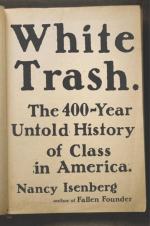|
This section contains 1,186 words (approx. 3 pages at 400 words per page) |

|
Summary
Isenberg begins this chapter by introducing the background of founding father Thomas Jefferson. Jefferson was part of the Virginia gentry and a gentleman farmer. Through extensive reading and research, Jefferson concluded that the ideal American society was one of farmers large and small. He advocated for the education and freehold status for the lower class to level Virginia’s large class disparities. His reform efforts were halted, however, by a powerful Virginia gentry that did not share in his interest of raising up the poor. Isenberg is quick to note an interesting irony behind Jefferson’s story: his privileged upbringing firmly separated him from the common farmer he claimed to advocate for. Jefferson saw human behavior as adaptable, supporting his theory that productive land owners over time would increase the general human stock of America. He...
(read more from the Chapter 4: Thomas Jefferson's Rubbish: A Curious Topography of Class Summary)
|
This section contains 1,186 words (approx. 3 pages at 400 words per page) |

|




